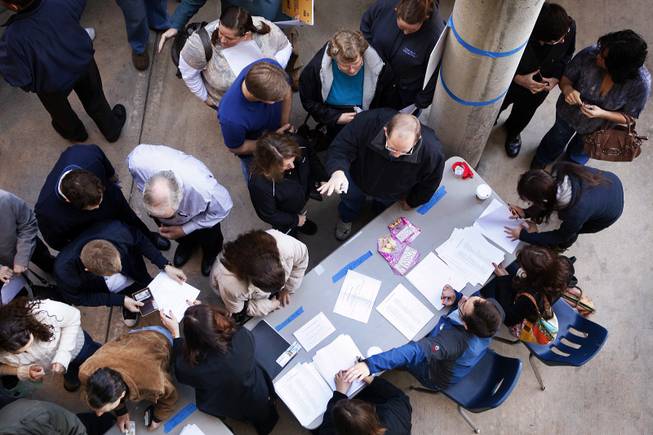
Voters sign in for the Republican presidential caucus at Green Valley High School in Henderson on Saturday, Feb. 4, 2012.
Friday, March 13, 2015 | 5:34 p.m.
WASHINGTON — When it comes to presidential politics, it’s not enough for some Nevada politicos to be first in the West: A bill proposed today in the state Legislature would move Nevada’s presidential nominating system to first in the nation.
The bill, proposed by Assemblymen John Hambrick, R-Las Vegas, and Stephen Silberkraus, R-Henderson, would change the Nevada Republican and Democrat presidential caucuses in February to a primary election in January.
The bill also calls for moving Nevada’s June primary for all other races to January, too.
The goal is to put all eyes on Nevada by making it the first state in 2016 to choose its presidential contenders.
It also changes both parties’ current caucus system — more like a town hall meeting that a fervent few tend to participate in — to a primary election, where a wider swath of voters cast ballots at their polling location.
The proposal, however, is coming under fire from both parties.
Nevada Democrats say it protects Republican incumbents by giving Democrats less time to campaign.
Some Nevada Republicans, who are generally supportive of switching to a primary, are concerned that holding it in January would break the party’s national rules.
“Having a primary would be a very smart move by the Republican party,” longtime GOP strategist Jim Denton said in an email. But moving the nominating contest up to January would make elections prohibitively expensive and disengage voters already tired of the never-ending campaign, he said.
Nevada is one of four states the national parties allow to hold their presidential nominating contests before March 1. The others are Iowa, New Hampshire and South Carolina.
But under Republican rules, no contests are allowed before Feb. 1. Iowa is currently the first, scheduled Feb. 1, with Nevada the third on Feb. 20.
If Nevada moves its caucus or primary to January, it risks being stripped of at least half of its delegates.
That could give Nevada less say in choosing the next president and even encourage some presidential candidates to skip the state. (Democrats fear the same punishment will befall them if this bill passes.)
“It just makes you look bad,” said University of Reno political science professor Erik Herzik.
Still, supporters of the bill tout the benefits of a primary, which political scientists agree is more inclusive than a caucus because it takes less time to participate and allows more time for voters to get to the polls.
“If you have a full-blown process, you will have more people weigh into who should be the leader of the free world,” said Sen. James Settelmeyer, R-Fallon, who authored a similar bill in 2013.
In a caucus, voters spend an hour or two making and listening to speeches with their fellow precinct neighbors. They crowd in corners of a high school gym or raise their hands to vote for their nominee.
In a primary, voters have an entire day to stop at their regular polling location and cast a ballot for their chosen candidate, similar to a general election.
Across the nation, caucuses generally draw 5 percent of voters, while primaries can draw anywhere from 15 percent to 25 percent, said Darrell West, an elections expert with the Brookings Institution.
In addition, caucuses require more organization than a primary, and in Nevada, the burden of cost is on the state party.
That’s yet another problem for Nevada’s Republican Party, which has has struggled with fundraising and organizing since grassroots conservatives surged into control in about 2004, prompting traditional Republicans to split off.
Some insiders say the weakened state party has struggled holding caucuses since the state first started staging them in 2008.
In 2012, Washoe County GOP Chairman Sam Kumar said due to a data error, people were sent to the wrong caucus locations. Voters locked out were banging on the doors, demanding to be let in and participate.
In Clark County, the party was criticized for not releasing results in a timely manner.
And at the Republican National Convention, some Nevada delegates illegally cast their vote for Ron Paul instead of the candidate caucus-goers chose, Mitt Romney.
“We need to make sure, as a state party, that we do not have that again and to make sure the presidential candidates want to come here,” said Nick Phillips, political director for the Clark County GOP,
The bill’s chances in the Republican-controlled Legislature remain to be seen.
If it fails, all is not lost for Nevada Republicans hoping to switch to a primary.
The state party is holding a meeting on March 28 in Carson City where participants will vote on whether to turn the February caucus into a presidential preference poll, which is more similar to a primary.

Join the Discussion:
Check this out for a full explanation of our conversion to the LiveFyre commenting system and instructions on how to sign up for an account.
Full comments policy